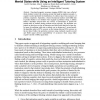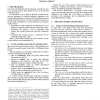287 search results - page 13 / 58 » A Formal Tutoring Process Model for Intelligent Tutoring Sys... |
UMUAI
2008
13 years 7 months ago
2008
Abstract. Self-efficacy is an individual's belief about her ability to perform well in a given situation. Because selfefficacious students are effective learners, endowing int...
EDM
2010
13 years 9 months ago
2010
Functional magnetic resonance imaging (fMRI) data were collected while students worked with a tutoring system that taught an algebra isomorph. A cognitive model predicted the distr...
ECAI
1998
Springer
14 years 3 days ago
1998
Springer
AAAI
2007
13 years 10 months ago
2007
AIED
2009
Springer
14 years 16 days ago
2009
Springer
We explored the possibility of predicting learners’ affective states (boredom, flow/engagement, confusion, and frustration) by monitoring variations in the cohesiveness of tutori...


